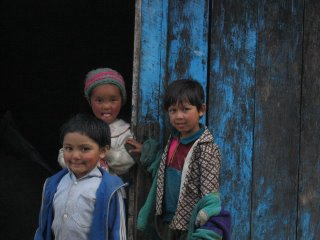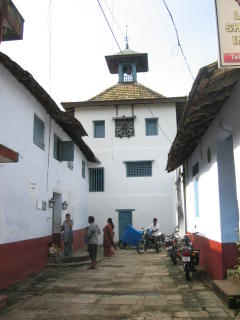Lost in the Himalayas
 OK, I know it's been a very, very long time since I updated this blog, but I've been lost in the Himalayas. Really.
OK, I know it's been a very, very long time since I updated this blog, but I've been lost in the Himalayas. Really.
Interesting to note: the Indians put the stress on the second syllable of Himalaya and hardly pronounce the second "a," so it sounds more like "Hi-mal-ya". I'm not sure how I feel about that. It does make it sound a little less, well, Spanish.
So, where to begin? We set off for Darjeeling on a warm day in October. We flew on Air Deccan, which is striving to revolutionize air travel in India by making it accessible to everyone. They offer ridiculously low-priced fares to the first few people who call in - these customers can fly from Chennai to Delhi for $5 or so. The rest of us still get low fares, but they've really taken the last frills out of no-frills. They don't even give you water for free. I wouldn't mind so much except that the food they sell on board is somewhat disgusting.
We arrived in Calcutta late at night, and felt the first hints of urban hostility while still at the airport. We waited in line for about 20 minutes for train tickets, only to find that as foreigners we weren't allowed to use that ticket window. We were told we had to go downtown for train tickets. We then ran into a white guy who also seemed lost and arranged to share a cab with him to the center of town. During the ride he regaled us with his stories of all the Cambodian women he has slept with and adopted (not sure which order that goes in), including some rather tragic incidents involving suicide on the beach and HIV. I don't think he even got our names.
The next day, we set out to explore Calcutta but found that it really wasn't worth it. The place is twice as crowded as Bangalore and half as charming, and that is saying a lot, considering that Bangalore is very crowded and not very charming. We did manage to get our train tickets after waiting in line some more, and we tried to visit a few parks, but we were soon exhausted and frustrated. Calcutta is the first place on earth where I have been afraid of being run over by pedestrians.
We decided to leave as soon as possible, and caught a train to Darjeeling that night. Well, actually we caught a train to the city nearest to Darjeeling on the rail line, and then grabbed a "share jeep" with some very innocent-looking blond English youngsters. They turned out to be 18 and straight out of high school. They were volunteering at a music school near Calcutta, and this was their first trip out into the world. We enjoyed the two-hour trip up the winding road and even got to eat some excellent momos (Tibetan dumplings) on the way. The little girl in the seat in front of us only threw up once, and her sister didn't throw up at all. I should add that this was not the fault of the dumplings. Every time you take a vehicle up a mountain in India and there are children in the car, they throw up. It all makes sense once you've hit your head against the ceiling of the vehicle a few times.
Darjeeling is a pleasant English city with lots of teashops and a few pubs. We found a clean, sunny guesthouse with a view of the Himalayas, and drank some Darjeeling tea at an overpriced tea shop. Then we started to plan our escape from the city into the mountains. We had hoped to go to Sikkim, but that required a permit, and we don't have much luck with permits in India. In fact, we did try to get the permit only to be thwarted by a sign that said the permit office would not be open until Monday afternoon. Since our time in the mountains was limited, we decided to head to the Nepalese border instead. It turned out that Sophie, our young English friend, was also planning on heading this way with a new-found friend, a South African doctor named John. The other English boy, Andy, had not quite decided whether he wanted to go or not. Somehow, the night before we were set to leave he decided he did want to come and quickly geared up with gloves and sweaters sold by the Tibetan women along the pedestrian mall.
The next morning, we all piled into a share-jeep for the 90-minute drive to the trailhead. There, we stopped at a border checkpost and Andy realized that he didn't have his passport. We tried to talk the guard into letting him through, and even to bribe him, but to no avail. Andy got a ride back, saying he would join us later that day, but ultimately he decided to stay in Darjeeling. When we got back we heard that he had headed to Sikkim with some American girls, so we hope that turned out well.
The beginning of the hike was quite difficult. Basically, you get to the border with Nepal and there's a set of staircases going straight up. It was a bit disconcerting to have old ladies, men carrying firewood on their heads, and little kids racing past us, but we did finally make it. I thought the trail was going to be far from civilization, but in fact there's a chai stand every ten kilometers or so. It was a big holiday weekend, so tons of people from Calcutta were hiking. The men were walking with cellphones, the women were carrying handbags, and it did not seem remote at all. Some of the city people seemed to be skipping the difficult part of the trail by riding up in a jeep. The first night we stayed at a guesthouse run by a Tibetan matriarch. She ran a tight ship, with a dozen women working in the kitchen and men who seemed rather scared of her creeping around on tiptoe. The lodge was very comfortable, with four beds to a room. I am not sure if it was because eight hours of walking in the mountains had made us hungry and cold, but the food was absolutely delicious. We had the best vegetable soup I have ever tasted for dinner and tasty Tibetan pancakes for lunch.
The first night we stayed at a guesthouse run by a Tibetan matriarch. She ran a tight ship, with a dozen women working in the kitchen and men who seemed rather scared of her creeping around on tiptoe. The lodge was very comfortable, with four beds to a room. I am not sure if it was because eight hours of walking in the mountains had made us hungry and cold, but the food was absolutely delicious. We had the best vegetable soup I have ever tasted for dinner and tasty Tibetan pancakes for lunch.
The next morning, we woke up early in order to make it up to the high point of our trek before dark. We stopped at a guesthouse for lunch, and said goodbye to Sophie and John, who were staying there for the night, as they were on a longer trek and could take their time. Then we headed out. The clouds were very low on the mountain, and the visibility was poor. We climbed up the first part of the path on the jeep road, and then found a small path that seemed to cut across the mountain. We started out on the path, which was increasingly green and pleasant. After an hour of walking, however, we realized that the path was going down. We tried to convince ourselves that the path would climb up again, but it just kept going. There were no other tourists on the path, just a young boy and his cows.
We continued on the path for another hour, until at long last we heard voices on the road. There were two voices calling out, either to us or to each other. Further ahead we caught sight of a middle-aged man and a teenaged boy. "Is this the path to Sundakhpu?" we asked.
The man smiled broadly. He was missing a few teeth. "Sundakhpu? Noooo," the he answered. "Rimbik."
Our hearts sank. We had only an hour before dark, and we were headed the wrong way.
"How far is it to Rimbik?" we asked.
"Fifteen kilometers."
We knew we were sunk. There was no way we could walk fifteen kilometers before nightfall. The man and his son pointed out the way back to the last guesthouse and headed off at breakneck speed. We decided to follow them. However, they were moving at roughly three times our pace, literally running along the tiny footpath, so we soon lost sight of them.
Half an hour later, we saw the man and his son again. They were sitting at a fork in the road, chewing on blades of grass like a speedy rabbit in a children's cartoon. 'This way, short," the man said, pointing into some deep vegetation. He offered to take us back along that route. We agreed, and followed the two men. They shouted and whistled constantly, one in front of us and one in back, as though reassuring each other that they were both still there.
We could tell that they were trying to move slowly for our benefit, but it was still an effort to keep up. We ran through bushes, jumped across streams, and scrambled across rocks. Finally, the older man told us he was leaving us in the care of his son and going on ahead. We guessed he was going to tell his wife that they would be late.
Just as dusk approached, we saw the dark silhouette of a cow against the red sky, the lodge we had left at lunchtime in the distance behind it. We entered the restaurant. Our new friend sat at the fireplace, drinking tea with a group of other men. He seemed quite amused at having saved a pair of foreigners from the wilds of Nepal. We were a bit disappointed to have abandoned our trek to the top, but we were happy to be in a warm place.








